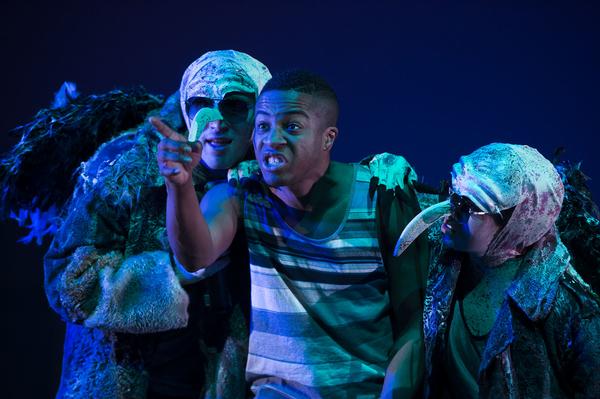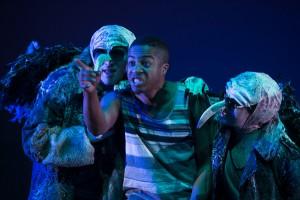
In most acting arenas, flat foil characters exist to complement and develop the more complex personalities of their peers. The Theater and Performance Studies Program’s current production of “Slow Falling Bird” transcends this usual strategy, embedding into each of its characters a multidimensional identity that enriches their overlapping stories. Combined with elements of the surreal, this chaotic yet nuanced approach strikes directly at the heart of a largely ignored political reality.
The play takes place in the Woomera Detention Centre in the South Australian desert. While its characters are fictional, the setting is not — since the late 1990s, this immigration camp has been the subject of controversial headlines concerning the mistreatment and gross abuses of its refugees. From self-inflicted wounds and attempted suicides to hunger strikes and riots, real-life asylum seekers in Australia have resorted to ever more drastic measures to have their voices heard by the international community.
The cruelty of the Woomera Detention Centre began the contemporary conversation on Australian asylum-seeking policies, and its use as the central location in “Slow Falling Bird” immediately sets a grim and foreboding mood. The play follows several different storylines, including the perspectives of the Australian guards as well as those of several of the refugees living in the camp. It explores how these divided cultural groups interact in such a desolate place and attempts to look into the minds of the individual characters. The story oscillates between realistic depictions of camp life and surrealistic scenes of a refugee’s unborn baby as well as a pair of human-sized crows, both of whom are able to share dialogue with the many characters of the play.
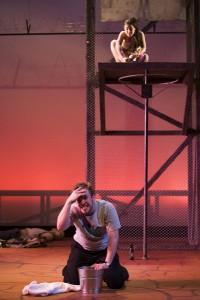
The story is rich with ambiguous symbolism that connects all the characters by a common “chord” (this word gets repeatedly stressed). Motifs such as blinding sunlight, flies, and most importantly, the ocean, are applied by the guards and refugees in different contexts and relate to different aspects of their lives, and so their implications are never quite fully comprehended.
To an extent, it seems that this chaotic symbolism was intentional. “I take [a] poetical image-based approach to social questions,” playwright and music director Christine Evans said during a conversation after Thursday’s showing. “The refugees were always talked about in terms of floods coming in and drowning … and so the imagery of the flood and the driest land of earth and the xenophobia and fear behind it stuck in my head.”
Simply put, “Slow Falling Bird” is difficult and at times uncomfortable to watch. In every aspect of the production runs a thread of this fear and xenophobia, manifesting in ways both tangible and intangible. On the left of the stage are lined three chairs — one for each of the two guards as well as one for one of the guard’s wife — which they sit in while waiting to enter different scenes. On the opposite side of the stage, two siblings and the mother of the surreal unborn child have no such luxury — these refugees sit cross-legged on the floor. Thus, even when they are not participating in the action, the characters are placed in a way that hierarchically divides them from each other.
In forming the play just so, Director Rosalba Clemente sought to approach such a polarizing political issue in a way that would resonate beyond simple arguments of right versus wrong. “What I have most wanted to achieve is to highlight the actual embodied and visceral experience of the refugee in detention. … The flesh and blood emotion, the traumatized inner landscape and psychic terrain of enforced containment and repression of people who already arrive fleeing persecution and terror to be then doubly terrorized,” Clemente said.
Alone, the psychological dissection of the guards and refugees would provide overwhelming material for a play; combined with the unsettling dreamlike qualities of Evans’ imagination, the cast and crew faced a new challenge in bringing the play to fruition.
“I worked hard to ground the philosophical language of the play to the raw emotions of the character. Once I bridged that gap, I felt like I had a better grasp on the philosophical writing. That’s the wonderful thing about Christine’s plays; they reverberate really widely because the language is so textured,” Madeleine Kelley (COL ’16), who plays the unborn baby’s mother Zahrah, said.
A victim of repeated physical and sexual abuse within the detention center, Zahrah is perhaps the toughest character to watch. She struggles as a mother, with a baby unwilling to eat or drink in this terrible place, and as a refugee unable to speak the country’s native language. Eventually, her continuously antagonistic encounters with the ill-tempered and exploitative guard Rick lead her to commit suicide.
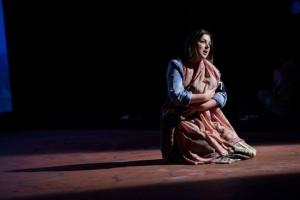
Kelley’s performance shakes these heart-wrenching moments to their core. Deftly jumping back and forth between fits of passion, rage, sorrow and dread, she is able to evoke immediate sympathy from viewers and keeps the audience gripped for the duration of the play. She handles each sentence with poignant perfection, never once stumbling over her lines and delivering individual words with the full force of her emotional range.
This astounding acting, while ultimately rewarding, took its toll on Kelley at times. “I found the most challenging thing for me was truthfully maintaining the level of brokenness and vulnerability that Zahrah feels. … She’s escaped from a war-torn country, recently been widowed, seen her sons drowned, and has swam to shore while very pregnant and very lost,” Kelley said. “Forcing myself to get in touch with her emotional circumstances and then allow myself to be systematically broken down during the play is challenging because it is so — to put it mildly — unpleasant. It’s exhausting.”
Caleb Lewis (COL ’16) plays the disgruntled guard Rick, who psychologically and physically traumatizes Zahrah. The beginning of the play paints Rick in a much more understanding light: he is madly in love with his beautiful wife Joy, but their relationship has become strained as a result of her multiple miscarriages. Rick takes this frustration out on the refugees and the children at the detention center, and at first one can at least attempt to justify his anger. However, as his storyline progresses, Rick’s morality deteriorates to the point that his character becomes wholly intolerable and unredeemable.
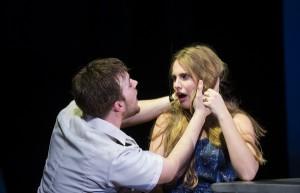
This role was extremely taxing on Lewis as well. “One of the hardest things for me was being willing to go there, in a way. This is a guy who is very different from me. One could argue he’s not a very good person — he does a lot of things people would find repulsive. And when you’re acting, you need to go there. You have to feel free to be that bad guy. That I found very challenging — to accept my character for who he is and be willing to do that,” Lewis said.
While it is already remarkable that the actors and actresses of the play are able to adopt such nuanced personas, it is doubly impressive that these talented individuals all belong to the Georgetown student body. Clemente and Evans envisioned them in a play that would not shy away from such harrowing material, and the two maintained faith in the cast throughout this demanding process.
“The minds of the young are not made of glass,” Clemente said during the post-show conversation. “They already carry every human emotion and every human experience inside them. … All you need to do is trigger that.”
“Slow Falling Bird” is a hard-hitting story whose importance extends far beyond the stage. It refuses to sugarcoat any aspects of life in Australia for current asylum seekers, forcing audiences to witness and confront the injustices faced by these displaced groups on a macro and micro level. From Zahrah’s shaking frame during her encounters with Rick to her unborn daughter’s clenched toes as she stubbornly curls into the fetal position, the most subtle of movements add to this chilling effect.
By no means is this a one-sided attack on all Australians — Evans paints her antagonists holistically in order to show how complex these social and political dynamics really are. All the characters have a backstory that influences the way they behave, and through these varying strands of thought and emotion, the cast is able to connect with the story in different ways.
“Because of differences in the dialects and nationalities of these characters, when we came together to talk about what the play means, we all had a different perspective about it,” Lewis said.
TPST’s production of “Slow Falling Bird” stays true to the play’s jumbled nature, which oscillates between the real and the surreal. This disorder makes the plot less easily digestible, but the chaos it creates allows viewers to focus on the raw emotions of the actors as they too attempt to navigate through endless societal obstacles. It is only fitting that the final moment of the play ends with deafening stormlike sounds, as the political and cultural implications that it raises are equally tempestuous.
The last two performances of “Slow Falling Bird” run tonight and tomorrow night at 8 p.m. at the Gonda Theatre in the Davis Performing Arts Center.


